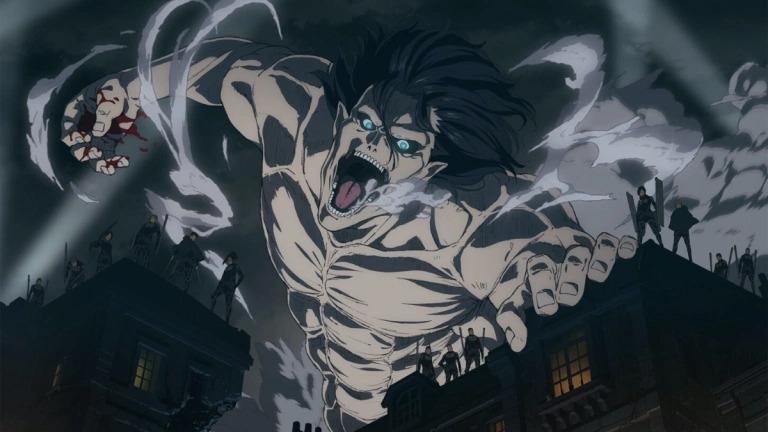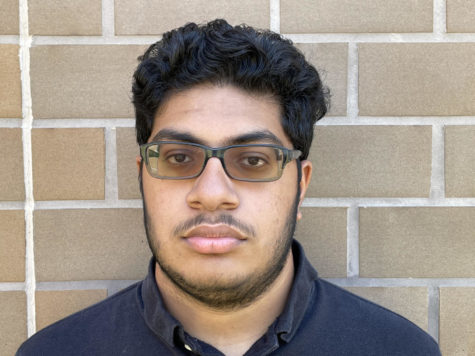Fate, not Freedom: An analysis of Attack on Titan and its ending
May 28, 2021
Warning: Spoilers for Attack on Titan manga and potentially anime
Last March, one of the most popular manga series in the world, Attack on Titan, reached its conclusion. And, like most of the manga, the ending was controversial. Some praised it as a fitting end to the manga, while others saw it as rushed and poorly written.
For the uninitiated, Attack on Titan is a manga (Japanese comic) series written and illustrated by Hajime Isayama. It follows the story of Eren Yeager, a human living in a world where humanity lives in three ginormous walls that protect them from a race of man-eating humanoids, known as Titans. Eren has vowed to rid the world of Titans after his mother was killed by one when he was a child. Throughout the series, Eren joins the military and he, along with his friends and fellow soldiers, tries to drive back the titans from the walls and learn the truth about them.
The big mystery of the show, of course, is the Titans. Of the titans, 9 of them are intelligent and can shift between human and titan form. Eren himself can shift into a Titan known as the “Attack Titan”. These “Titan-Shifters” are essential to the plot as it is they who are the movers and shakers of the setting. For example, the Colossal Titan was the one who broke down the first wall, leading to Titans invading Eren’s hometown of Shiganshina and slaughtering its residents.
Eventually, it is revealed that all titans are former humans, altered and twisted by a chemical serum. This race of humans, known as “Subjects of Ymir”, are feared around the world for their ability to turn into titans, and therefore are treated like scum and were only kept around for their ability, which the country of Marley uses effectively in war. The Subjects were sent to internment zones, with the biggest one being the island of Paradis (aka the Walls aka Eldia). From this point onwards, the story takes up a new angle that it’s been building towards. In a dramatic turn of events, our former hero, Eren, becomes the main antagonist. To protect his home of Eldia, he decides to commit genocide on a massive scale, summoning gigantic titans to destroy every other human being on the planet. Only through the combined efforts of his former allies and enemies, he is defeated.
So, it seems like a solid story, right? So why is it so controversial? Well, first of all, the ending can be viewed as dissatisfactory from multiple angles. Some people say that the ending rips off of Code Geass. Others are comparing it to Game of Thrones, which was notorious for its ending completely flopping onto the pavement. The fact of the matter is, the conclusion was at best, mediocre compared to the rest of the manga. Or, at least that’s what people are saying.
There are some valid criticisms, no doubt. For example:
- Ymir, the first Titan Shifter whose spirit helps Eren with his plan, continues to give her subjects the ability to become Titans despite it causing them pain and suffering over the course of hundreds of years… because she was in love with her abusive husband, who ordered her to keep on giving the powers?
- Eren’s plan of genocide only managed to delay people from attacking Paradis further, forcing Eldia to adopt a militaristic/fascist ideology in order to protect themselves from further retaliation.
- Eren was somehow forgiven by his comrades for his plan of genocide?
- Eren at the last possible minute became the “hero” again.
- Eren could’ve just used the Founding Titan to remove the Titan ability from the Subjects of Ymir in the first place, preventing the need for genoicde.
- And last, but not least: Despite Eren’s rantings of freedom, he still was bound to the predestined route of genocide.
So is this redeemable? Well, certain types of media age like fine wine. Take, for example, Spiderman 3, specifically the infamous dance scene. When that came out, people were… less than impressed with it. And who could blame them? When watching that scene, people felt uncomfortable and weirded out by the awkwardness of the whole thing. Looking back on it now, however, one can see that that was the point. At that point in the movie, Peter was wearing the Venom Symbiote, which causes his entire personality to change. His idea of self-confidence, which was completely unrealistic, causes us to cringe. The point of the change was to show how even Peter was corruptible. He, of course, eventually realizes this and discards the symbiote.
There are two points we can take away from this. One, the subtext behind this was obvious in hindsight, once we watch the movie again. No matter how long it takes, the story will look better once we fully absorb everything that happens, maybe read it again once or twice. And two: this was a planned thing. This was there from the beginning. And these two points can be applied to Attack on Titan as well.
Obviously, Isayama is not some sort of genius and had his story planned out in minute detail from the beginning. That is something that not even the strongest of writers can manage. However, the general storyline and plot was something that was decided on in the first few months of the manga’s production. And if we look at the story again throughout the entire manga, we can see one thing.
Attack on Titan is not a tale of freedom. It is a tale of fatalism, of fate.
This seems odd and contradictory, considering the entire story seems to be about freedom at first glance. The Scouts are fighting for their freedom. The Warriors (Marley’s Titan Shifter soldiers) are fighting for freedom and security for their families. etc. etc. However, if we look closely, we can see the elements of fatalism running deep. From the outset, the Survey Corps are explicitly told they’ll probably end up as titan fodder. The Titans are a certainty. The Titans are always there. This generates fear, and horror.
To counteract this fear, the people of Paradis had to keep on going, keep getting their hopes up. They wish for freedom, but they can’t have it, so they turn to an alternative. As Kenny Ackernman says in chapter 69, “Everyone had to be drunk on something to keep pushing on … Everyone was a slave to something.” The people within the Walls had to keep on going, keep on pushing for that one spark of hope. That hope manifests later on in the form of Eren Yeager, who wields the Attack Titan, the very symbol of Eldia’s hope. But even that is predetermined by fate as well. In chapter 121, Eren reveals that he used his Attack Titan’s ability of Future Memory Inheritance to influence his father into giving him the Attack Titan and Founding Titan. So from the very beginning, the events of the series were predetermined, set in stone. Eren was fated to inherit the Attack Titan, and was fated to commit genocide.
Let’s look at this from a different perspective: the Nordic one. It’s no surprise that Attack on Titan draws a lot from Norse Mythos with names like Ymir and the Titans being directly linked to the Giants. But there’s a lot more to this. In a thesis written by u/Bandwarrior on reddit, he points out the different mythological aspects of Attack on Titan. Norse Mythology focuses a lot on the concept of fate, with Odin always trying to avoid his fate, and of course, the ever approaching threat of Ragnarok, the apocalyptic battle that will end all creation as we know it. Lookie here, we see that we have an apocalyptic battle in the final chapter as well.
Bandwarrior explains that the different members of the cast of Attack on Titan are parallels to different Norse Gods. Erwin Smith, leader of the Survey Corps before his untimely demise, is Tyr, the one handed god of Justice (Erwin also has one hand, in case you were wondering). Levi Ackermaan is Thor, slayer of Giants and protector of Humanity. Hanji, or Hange, is Odin, one eyed god of War and Wisdom. So who is Eren?
He is Surtr, the Bringer of Ragnarok.
Surtr is destined to cross the Bifrost and strike the first blow against Midgard. He barely pays attention to the beauty of the Bifrost, only focused on the enemies ahead of him. Now, who does that sound like? Eren crossed the ocean, not caring for its beauty (as seen in Chapter 90, where he thinks to himself that freedom will not come unless everyone in Marley is dead). Surtr has been waiting his whole life for his destiny, his revenge.
And Eren’s destiny too, is to bring carnage and destruction. That is simply what was foretold by his future memories, and he decided to follow that path. Why? Because he’s confused. Eren is a slave to destiny. He represents us as humans, always fighting for that spark of hope. His one freedom is to try and fulfill his destiny to create a better future. I believe the moral of this story is: freedom is a lie, and in chasing it, we become slaves to the fate that envelops all of us.
Is this a really pessimistic ending? Very much so. But I think that’s the point. The author tells us that we as human beings are bound to fate, and the only freedom we’ll ever get is to accept that and move on.



Anonymous • Jul 20, 2021 at 2:39 pm
Thank you.
Honestly I look back at what we’ve got and what we could’ve got, and I don’t know if I’m gonna cry or laugh!
What happened to the person who created all those epic moments and why did all of those deaths and sacrifices reduce to yMiR WaS iN lOvE with HeR AbUsEr?!!!
It’s sad. It’s so damn sad…